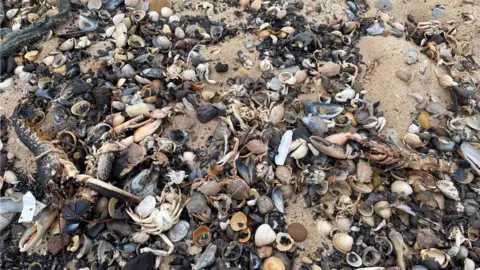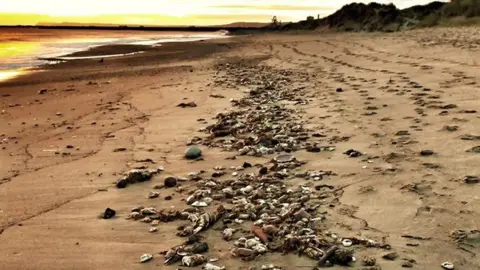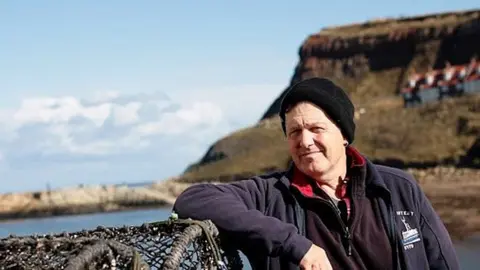Shellfish deaths: Toxic chemical could have killed crabs, study says
 Sally Bunce
Sally BunceA toxic chemical is more likely to have caused thousands of crab deaths than natural algae, a study has claimed.
Fishermen up the North East coast have said their industry has been devastated by large wash-ups of dead crustaceans.
A study by several universities commissioned by the fishing industry said pyridine, which could have been released by dredging, was more likely.
The Department for Environment, Food and Rural Affairs (Defra) said it was a "complex" issue but algae was to blame.
The £30,000 study was commissioned by the North East Fishing Collective following a crowdfunding appeal and carried out by academics at Newcastle, Durham, York and Hull universities.
Marine biologist and Whitby Fishermen's Association chairman Joe Redfern said the research was "very conclusive" and "should change the argument" between the shellfish industry and the government.
Although it is yet to be peer reviewed, the study's early report said tests found pyridine, which is used as an anti-corrosion treatment in marine infrastructure, was "highly toxic" to crabs "even at low levels" and caused twitching and paralysis before death similar to witness reports made at the time of the mass wash-ups.
 Paul Grainger /PA Wire
Paul Grainger /PA WireMarine pollution expert Tim Deere-Jones had previously used Environment Agency data to conclude pyridine levels in some of the crab samples from the wash-ups were 70 times higher than in crabs from other areas.
Computer modelling in the latest study of dredging work in the Tees estuary in September and October 2021 concluded "significant amounts of pyridine" could have spread down the coast as far as Whitby if it had been in the sediment.
The report said such a pyridine release would have been "sufficient to kill approximately 10% of the crab population at Peterlee and Whitby, 30% of the crab population at Runswick Bay and over 50% of the crab population at Redcar".
The study said no pyridine was found in water samples taken around the estuary in May 2020 but it was discovered in sediment samples at eight out of 12 sites both near and offshore.
"The results support the suggestion that pyridine and dredging could have played a major part in the observed mass mortality events," the report said.
The study said a source of pyridine "remained to be identified" but it was a "common industrial chemical and at least one Teesside industrial plant is known to have handled large amounts of it before 2019".

The study also looked at evidence for an algal bloom which, given the "favourable" warm and calm sea conditions in autumn 2021, was present but was "not unusually large" and "several larger blooms occurred in 2021 and 2022 without causing mass die-off".
The report said not all algal blooms are damaging and the "circumstantial evidence to suggest that the October 2021 bloom was harmful is incomplete and contradictory", adding: "Harmful algal blooms usually kill a broad range of organisms but the Teesside events disproportionately affected crabs and lobsters."
The study concluded that while "many uncertainties remain" and further testing of the Teesside waters and sediment was needed, the "preliminary evidence suggests that crab deaths are more consistent with poisoning by industrial toxins than by natural algal toxins".
Mr Redfern said he hoped Defra would take the new study "on board", adding: "Experts, really senior and clever professors, have put their thoughts and their weight into this."

James Cole, who has fished out of Whitby for more than 35 years, said the situation had been "dire" with the deaths causing "months of absolute torture", but the new study had given him hope.
"Our main priority is the fact our environment has been trashed," he said, adding: "This picture that we've built up and all this proof - surely going forward, it can be acted on by the government."
Prime Minister Liz Truss told BBC Radio Tees that she would "look into" the issue and would be raising it with Environment Secretary Ranil Jayawardena.
Middlesbrough Labour MP Andy McDonald said the PM was "badly out of touch with reality" and she was "completely unaware of the horrendous marine fatalities along our coast".
'Complex scientific issue'
A Defra spokesperson said: "A comprehensive investigation last year included extensive testing for chemicals and other pollutants such as pyridine. It concluded a naturally occurring algal bloom was the most likely cause.
"We recognise the concerns in regards to dredging, but we found no evidence to suggest this was a likely cause. There have been no materials licensed for disposal at sea in the area which would fail to meet international standards.
"This is a complex scientific issue, which is why we took a thorough, evidence-based approach. We welcome research carried out by universities and will continue to work with them, including studying this report carefully.
"We are aware there have been some localised reductions in catch rates and we are continuing to monitor shellfish populations in the area."

Follow BBC North East & Cumbria on Twitter, Facebook and Instagram. Send your story ideas to [email protected].
